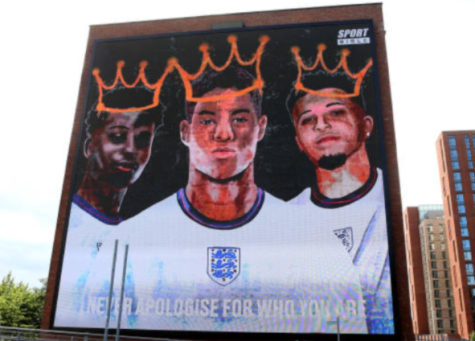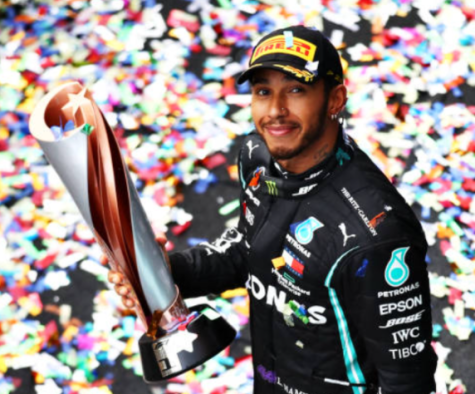Documenting the Online Racial Abuse towards Famous Athletes in 2021
February 4, 2022
On July 11th, 2021, a 23-year old, a 21-year-old, and a 19-year-old stepped up onto the biggest stage in world soccer to take the penalty kicks that would decide England’s fate in the European Championship Final. The hopes and dreams of a whole nation rested on their young shoulders. All three men were of African descent; the only black players in England’s starting roster. Sadly, that day England lost its chance of ending a 55-year-old trophy drought, after Marcus Rashford, Jadon Sancho, and Bukayo Saka all missed their penalty kicks.
In the following days after the match, “harassment and racist comments began to flood the social media accounts of the three players,” describes Becky Sullivan, of NPR News. Hundreds of thousands of disgusting messages on Instagram, Facebook, and Twitter were directed towards these young men. All three players had just experienced the lowest moment in each of their lives and now were being racially abused for the outcome of a sporting event. In addition to this online hate, Ryan Mac and Tariq Panja of the New York Times reveals that a day later, “a mural in the city of Manchester, England, depicting Rashford, celebrating his charitable work, was defaced in a way police have called ‘racially aggravated.’” Prominent leaders of England, Boris Johnson and Prince William, Duke of Cambridge condemned the horrid social media response, with Johnson declaring that “those responsible for the appalling abuse should be ashamed of themselves.” Renowned celebrities such as David Beckham and Dua Lipa stepped in to defend their countrymen as well. For Facebook and other social media companies who hadn’t placed tight enough regulations on “hate speech” on their platforms, the incident was a complete disaster. Celebrities all over the world, as well as many major soccer teams, boycotted social media for a week. “Facebook’s [own] employees [even] joined in, demanding that it do more to stop the harassment” (Mac & Panja). Social media corporations all released statements regarding the issue and promised huge changes in order to ban racist comments from their platforms. According to CNBC’s Ryan Browne, Instagram has limited the accessibility of racist content, while Facebook and Twitter have attempted to delete as many of these hateful messages as possible. But has that been enough to stop online racial abuse towards athletes?
In the months since the European Championship Final, the clear answer has definitely been “no.” Just one week after the three England players were harassed, seven-time world champion Formula 1 driver Lewis Hamilton, was subject to a torrent of hateful online messages, such as monkey emojis after his controversial victory at the British Grand Prix. Hamilton, the first and only black F1 driver and a fervent advocate for the Black Lives Matter Movement in addition to climate activism, nobly stated, “There’s no room for that abuse. But if I have to be on the receiving end of that in [the sporting] industry for people to become aware, then that’s part of my journey, that’s why I’m here.” Once again Twitter and Facebook pledged to instigate protection from online racial hate. But less than a month later, during the Tokyo Olympic Games, 132 abusive messages were sent to athletes competing in the competition. 63% of these messages were directed at black female athletes and a massive 89% of the abuse was directed towards US athletes (AP News).
Time and time again, we’ve seen social media companies publish statements condemning the issue but not take proper action to stop future online outpours of racist abuse. If we are to protect our athletes—the figures that inspire millions of people all around the world—then we must stop online abuse at its root and ensure that massive social media companies such as Twitter, Facebook, and Instagram feel the backlash necessary to be forced into facilitating permanent positive change on their platforms. We must realize that athletes experience the same human emotions and feelings as any other person on this planet. By taking the proper steps to block online racist abuse, perhaps much more compassionate and understanding feelings will be shown by fans to our athletes in the future.

Caption: After a mural‒ honoring Rashford for his contributions to stopping child hunger‒ was defaced, many community members covered it with kind and thoughtful homemade cards, before the painting was repaired.

Caption: A huge digital mural depicting the three victims of the online abuse‒ Saka, Rashford, and Sancho (from left to right) ‒was unveiled in the city of Trafford to show support for them.

Caption: Lewis Hamilton, 7-time Formula One world champion received a torrent of online abuse after his controversial victory at the 2021 British Grand Prix.






Tosh Schmidt • Mar 2, 2022 at 11:03 am
Good job Reilly.